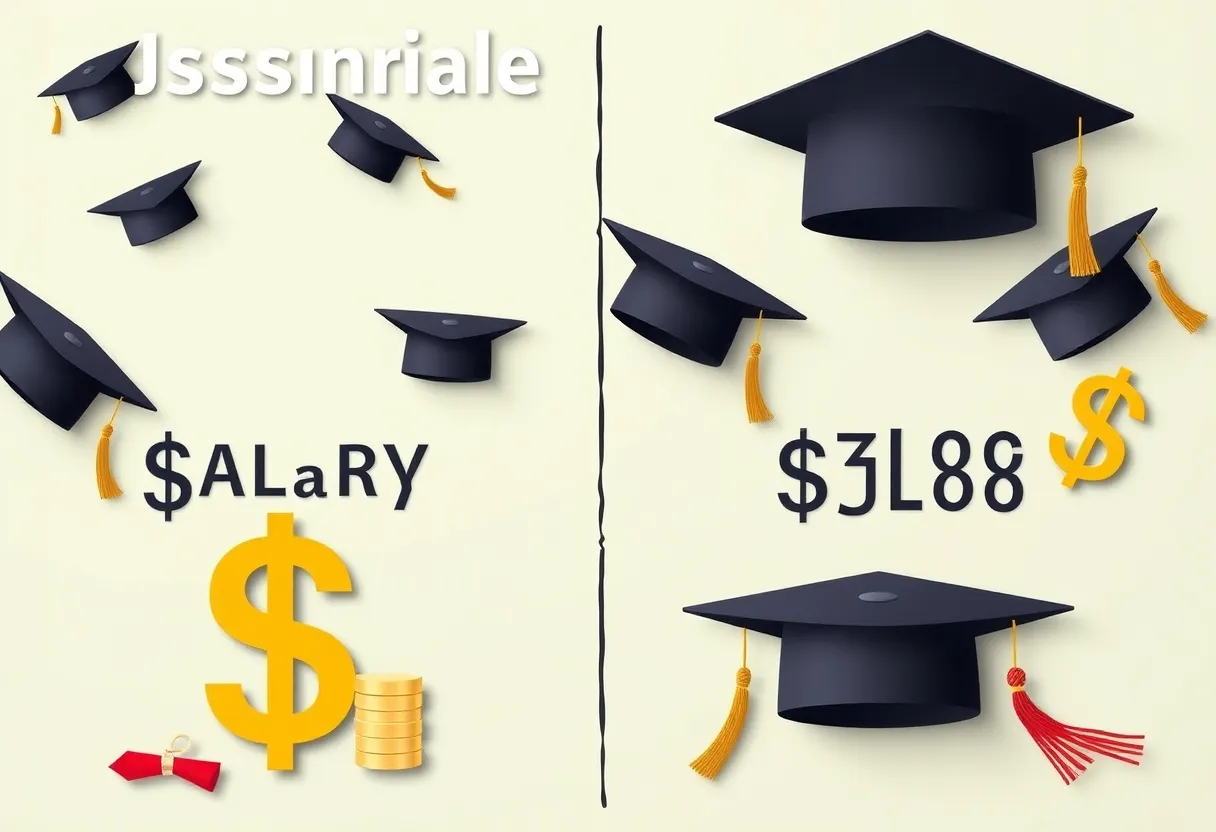News Summary
In Jacksonville, a notable increase in salaries for master’s and doctoral degree holders has been observed, with master’s graduates earning a median of $1,840 weekly. Doctoral holders report $2,278 weekly, while professional degree earners top at $2,363. However, tuition costs have escalated dramatically, raising concerns about the long-term value of higher education. Despite the financial benefits of advanced degrees, the increasing tuition and student debt have created uncertainty for prospective students.
Jacksonville has seen a significant salary increase for holders of master’s and doctoral degrees, alongside a concerning rise in tuition costs. As of 2024, master’s degree holders in the city are earning a median of $1,840 per week, representing a 19% premium over their undergraduate counterparts. In addition, those with doctoral degrees earn a weekly median of $2,278, while holders of professional degrees earn even more, at $2,363 weekly. This disparity highlights the benefits of advanced education in terms of both salary and job security.
The unemployment rate for master’s degree holders stands at 2.2%, lower than the 2.5% rate for those with just undergraduate degrees. Even more striking, individuals holding doctoral and professional degrees enjoy an unemployment rate close to 1%. These statistics suggest a strong demand for advanced degrees in the current job market.
However, the financial burden of obtaining these degrees is growing. Between 2000 and 2020, median annual tuition and fees for graduate programs soared by 233%, while the median student debt for graduate degree holders increased by 47%, reaching approximately $50,000. This escalation in costs raises important questions about the overall value of graduate education, especially considering the fluctuating job market.
Income Disparities Based on Degree Held
Workers in STEM fields with graduate degrees report an impressive average salary of $128,000 annually, nearly double that of individuals in the humanities and arts. Conversely, graduate degrees in humanities yield only a 10% earnings increase compared to those with bachelor’s degrees, which may deter students from pursuing such paths.
Job Market and Economic Stability
Job roles in Jacksonville vary widely in their educational requirements, with a considerable number of high-paying positions demanding advanced degrees. While the economic benefits of holding a graduate degree are evident, the rising costs and changing job landscape have led to skepticism regarding the return on investment associated with higher education. This skepticism persists despite the fact that the median salary for recent college graduates generally exceeds that of individuals who only possess high school diplomas. Specifically, lifetime earnings for bachelor’s degree holders can range from $630,000 to $1.5 million more than those who have not pursued further education.
A recent report indicated that graduates from Florida institutions show varying early income levels. Graduates from Florida State College at Jacksonville have a median income of $42,604 in their first year, while those from the University of North Florida earn $34,608. On the other hand, graduates with associate of science degrees from Florida State College at Jacksonville earn around $43,256, surpassing the state average for similar degree holders.
Employment Rates and Student Loan Debt
The employment landscape for associate degree graduates from Florida State College at Jacksonville is promising, with an impressive 77% employment rate for those over a five-year period. Additionally, federal student loan debt at Florida State College at Jacksonville averages $5,019, which is slightly below the state average of $5,283.
In summary, Jacksonville’s educational landscape is marked by rising salaries for graduate degree holders alongside increasing educational costs. While advanced degrees can provide substantial financial benefits and job security, the growing burden of tuition and student debt complicates the decision-making process for prospective students.
Deeper Dive: News & Info About This Topic
HERE Resources
NCAA Settlement Approved: A New Era for College Athletics
Job Market Shifts Open High-Paying Opportunities for Graduates
Jacksonville Named Second Hottest Job Market in the U.S.
Jacksonville City Council Rejects Proposed Pay Raise
Transformations in South Florida’s Housekeeping Industry
Florida Teacher Pay Hits Lowest Ranking Again
Florida Expands Electric Vehicle Infrastructure Amid Funding Challenges
Infinite Reality to Develop 60-Acre Campus in Fort Lauderdale
Pensacola Business Takes on Tariffs in Court
Miami Welcomes Rising Israeli Entrepreneurship
Additional Resources
- WFTV: Highest Paying Jobs in Jacksonville Requiring Graduate Degree
- WOKV: Highest Paying Jobs in Jacksonville Requiring Bachelor’s Degree
- Jacksonville.com: FSCJ Graduates Outpace UNF First-Year Incomes
- Stacker: Highest Paying Jobs in Jacksonville That Don’t Require a College Degree
- Santa Fe New Mexican: Highest Paying Jobs in Jacksonville for High School Graduates
- Wikipedia: Education in Florida
- Google Search: Highest Paying Jobs in Jacksonville
- Google Scholar: Jacksonville Job Market
- Encyclopedia Britannica: Higher Education
- Google News: Jacksonville Employment Trends
Author: STAFF HERE JACKSONVILLE WRITER
The JACKSONVILLE STAFF WRITER represents the experienced team at HEREJacksonville.com, your go-to source for actionable local news and information in Jacksonville, Duval County, and beyond. Specializing in "news you can use," we cover essential topics like product reviews for personal and business needs, local business directories, politics, real estate trends, neighborhood insights, and state news affecting the area—with deep expertise drawn from years of dedicated reporting and strong community input, including local press releases and business updates. We deliver top reporting on high-value events such as the Jacksonville Jazz Festival, Riverside Arts Market, and World of Nations Celebration. Our coverage extends to key organizations like the Jacksonville Chamber of Commerce and JAXUSA Partnership, plus leading businesses in logistics, healthcare, and entertainment that power the local economy such as CSX Corporation, Baptist Health, and VyStar Credit Union. As part of the broader HERE network, including HEREOrlando.com, HEREStPetersburg.com, HERETallahassee.com, and HERETampa.com, we provide comprehensive, credible insights into Florida's dynamic landscape.






